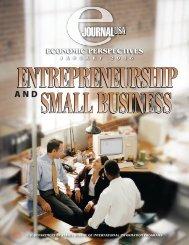s. history us history us history - Embassy of the United States
s. history us history us history - Embassy of the United States
s. history us history us history - Embassy of the United States
- No tags were found...
Create successful ePaper yourself
Turn your PDF publications into a flip-book with our unique Google optimized e-Paper software.
CHAPTER 13: DECADES OF CHANGE: 1960-1980OUTLINE OF U.S. HISTORYeasily in 1964. But on November 22,1963, he was assassinated while ridingin an open car during a visit toDallas, Texas. His death, amplifiedby television coverage, was a traumaticevent, j<strong>us</strong>t as Roosevelt’s hadbeen 18 years earlier.In retrospect, it is clear that Kennedy’sreputation stems more fromhis style and eloquently stated idealsthan from <strong>the</strong> implementation <strong>of</strong> hispolicies. He had laid out an impressiveagenda but at his death much remainedblocked in Congress. It waslargely beca<strong>us</strong>e <strong>of</strong> <strong>the</strong> political skilland legislative victories <strong>of</strong> his successorthat Kennedy would be seen as aforce for progressive change.LYNDON JOHNSON ANDTHE GREAT SOCIETYLyndon Johnson, a Texan who wasmajority leader in <strong>the</strong> Senate beforebecoming Kennedy’s vice president,was a masterful politician. He hadbeen schooled in Congress, wherehe developed an extraordinary abilityto get things done. He excelled atpleading, cajoling, or threatening asnecessary to achieve his ends. Hisliberal idealism was probably deeperthan Kennedy’s. As president, hewanted to <strong>us</strong>e his power aggressivelyto eliminate poverty and spread <strong>the</strong>benefits <strong>of</strong> prosperity to all.Johnson took <strong>of</strong>fice determinedto secure <strong>the</strong> passage <strong>of</strong> Kennedy’slegislative agenda. His immediatepriorities were his predecessor’s billsto reduce taxes and guarantee civilrights. Using his skills <strong>of</strong> persuasionand calling on <strong>the</strong> legislators’ respectfor <strong>the</strong> slain president, Johnson succeededin gaining passage <strong>of</strong> bothduring his first year in <strong>of</strong>fice. Thetax cuts stimulated <strong>the</strong> economy.The Civil Rights Act <strong>of</strong> 1964 was <strong>the</strong>most far-reaching such legislationsince Reconstruction.Johnson addressed o<strong>the</strong>r issues aswell. By <strong>the</strong> spring <strong>of</strong> 1964, he hadbegun to <strong>us</strong>e <strong>the</strong> name “Great Society”to describe his socio-economicprogram. That summer he securedpassage <strong>of</strong> a federal jobs program forimpoverished young people. It was<strong>the</strong> first step in what he called <strong>the</strong>“War on Poverty.” In <strong>the</strong> presidentialelection that November, he wona landslide victory over conservativeRepublican Barry Goldwater. Significantly,<strong>the</strong> 1964 election gave liberalDemocrats firm control <strong>of</strong> Congressfor <strong>the</strong> first time since 1938. Thiswould enable <strong>the</strong>m to pass legislationover <strong>the</strong> combined opposition<strong>of</strong> Republicans and conservativeSou<strong>the</strong>rn Democrats.The War on Poverty became <strong>the</strong>centerpiece <strong>of</strong> <strong>the</strong> administration’sGreat Society program. The Office<strong>of</strong> Economic Opportunity, establishedin 1964, provided trainingfor <strong>the</strong> poor and established vario<strong>us</strong>community-action agencies,guided by an ethic <strong>of</strong> “participatorydemocracy” that aimed to give <strong>the</strong>poor <strong>the</strong>mselves a voice in ho<strong>us</strong>ing,health, and education programs.Medical care came next. UnderJohnson’s leadership, Congress enactedMedicare, a health insuranceprogram for <strong>the</strong> elderly, and Medicaid,a program providing healthcareassistance for <strong>the</strong> poor.Johnson succeeded in <strong>the</strong> effortto provide more federal aid for elementaryand secondary schooling,traditionally a state and local function.The measure that was enactedgave money to <strong>the</strong> states based on<strong>the</strong> number <strong>of</strong> <strong>the</strong>ir children fromlow-income families. Funds couldbe <strong>us</strong>ed to assist public- and privateschoolchildren alike.Convinced <strong>the</strong> <strong>United</strong> <strong>States</strong>confronted an “urban crisis” characterizedby declining inner cities,<strong>the</strong> Great Society architects deviseda new ho<strong>us</strong>ing act that provided rentsupplements for <strong>the</strong> poor and establisheda Department <strong>of</strong> Ho<strong>us</strong>ing andUrban Development.O<strong>the</strong>r legislation had an impacton many aspects <strong>of</strong> American life.Federal assistance went to artistsand scholars to encourage <strong>the</strong>irwork. In September 1966, Johnsonsigned into law two transportationbills. The first provided funds tostate and local governments for developingsafety programs, while <strong>the</strong>o<strong>the</strong>r set up federal safety standardsfor cars and tires. The latter programreflected <strong>the</strong> efforts <strong>of</strong> a cr<strong>us</strong>adingyoung radical, Ralph Nader. In his1965 book, Unsafe at Any Speed: TheDesigned-In Dangers <strong>of</strong> <strong>the</strong> AmericanAutomobile, Nader argued thatautomobile manufacturers weresacrificing safety features for style,and charged that faulty engineeringcontributed to highway fatalities.In 1965, Congress abolished <strong>the</strong>discriminatory 1924 national-originimmigration quotas. This triggereda new wave <strong>of</strong> immigration, much<strong>of</strong> it from South and East Asia andLatin America.The Great Society was <strong>the</strong> largestburst <strong>of</strong> legislative activity since <strong>the</strong>New Deal. But support weakenedas early as 1966. Some <strong>of</strong> Johnson’sprograms did not live up to expectations;many went underfunded. Theurban crisis seemed, if anything, toworsen. Still, whe<strong>the</strong>r beca<strong>us</strong>e <strong>of</strong> <strong>the</strong>Great Society spending or beca<strong>us</strong>e <strong>of</strong>a strong economic upsurge, povertydid decline at least marginally during<strong>the</strong> Johnson administration.THE WAR IN VIETNAMDissatisfaction with <strong>the</strong> Great Societycame to be more than matchedby unhappiness with <strong>the</strong> situationin Vietnam. A series <strong>of</strong> South Vietnamesestrong men proved littlemore successful than Diem in mobilizing<strong>the</strong>ir country. The Viet Cong,insurgents supplied and coordinatedfrom North Vietnam, gained groundin <strong>the</strong> countryside.Determined to halt Communistadvances in South Vietnam, Johnsonmade <strong>the</strong> Vietnam War his own. Aftera North Vietnamese naval attackon two American destroyers, Johnsonwon from Congress on Aug<strong>us</strong>t 7,1964, passage <strong>of</strong> <strong>the</strong> Gulf <strong>of</strong> TonkinResolution, which allowed <strong>the</strong> presidentto “take all necessary measuresto repel any armed attack against<strong>the</strong> forces <strong>of</strong> <strong>the</strong> <strong>United</strong> <strong>States</strong> andto prevent fur<strong>the</strong>r aggression.” Afterhis re-election in November 1964,286287












